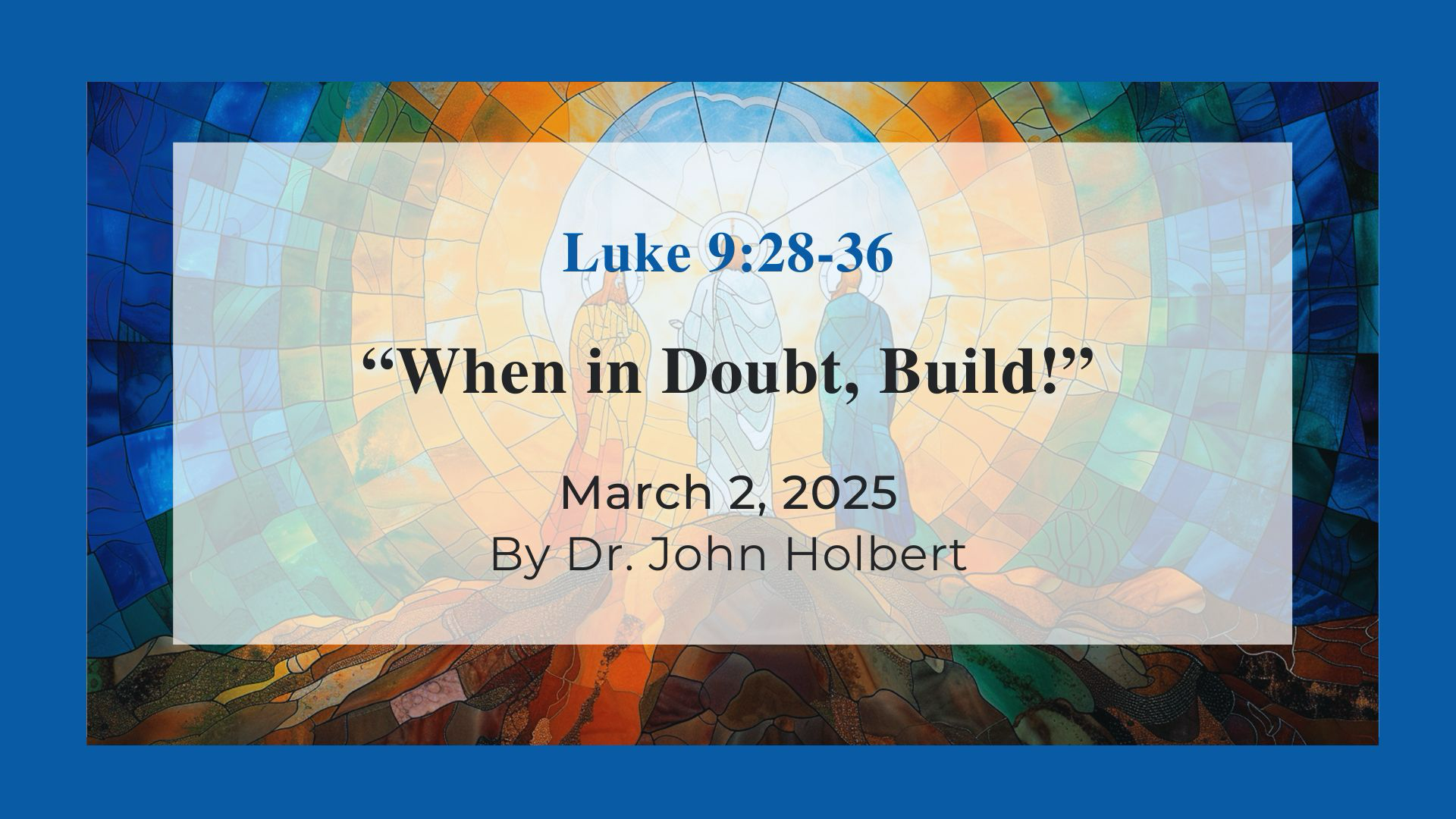When in Doubt, Build! Reflections on Luke 9:28-36, Transfiguration Sunday, Year C
by John C. Holbert on Friday, January 31, 2025

This uncanny scene is found in all three of the Synoptic gospels, but as usual with different emphases. In Luke, the entire tale is a prayer experience; “as he was praying,” says Luke in 9:29. When the change in Jesus occurs, Luke does not use the verb metamorphoreo (“change of form” = “transfigure” where the name for the celebration arises); he uses “appearance of his face (eidos),” reminiscent of the glory of YHWH before Moses at Exodus 24:17. It will not be the last reference to Moses in the scene. As we saw in Exodus 34, Moses’s face “glowed” after his encounter with YHWH; so here Jesus’s “face is altered,” along with his garments which become “dazzlingly white.” This appears to refer to several other passages in both testaments. See Ez.1:4,7, and particularly Daniel 7:9 where the Ancient of Days has garments white as snow. And later in the gospel the “men” (angels?) at the resurrection wear “dazzling” clothes (Luke 24:4). Indeed, the resurrection subtext is apparent in the scene.
Two men are said to be speaking to Jesus, Moses and Elijah. But only here in Luke do we hear what the conversation was about: “They spoke of his departure (exodus) which he was about to fulfill in Jerusalem” (Luke 9:31). This is a direct reference to the great work of Moses for Israel, about to be recapitulated in the death and resurrection of Jesus. Jesus is therefore a prophet just as Moses was.
Through this extraordinary conversation, the three disciples, Peter, John, and James, have been sleeping. When they wake up, they “saw the glory and the two men standing with him” (Luke 9:32). The three men in conversation “begin to withdraw from him (Peter),” so Peter tries to detain them by suggesting, “Master, it is a fine thing for us to be here; let’s make three tents, one for you, one for Moses, and one for Elijah.” Luke adds, “He did not know what he was saying.” Well, he might very well have known, actually.
Is it not the case that humans have long attempted to capture profound religious experiences in any number of fixed structures: canvas, wood, and stone have served builders for centuries who wished to commemorate events of special significance by constructing edifices of one sort or another? Peter here suggests pitching tents for each of the glorified worthies, because “it is a fine thing that we are here.” The immediate reference may be to the feast of booths (tents or sukkoth) which in the LXX of Deut.16:13 is called heorten skenon. But the desire to stay here, to be in this religious wonder for a longer time, is ubiquitous in religious human experience. Yet, Exodus and Deuteronomy often says, more than once, that “the Most High does not dwell in houses made with hands.” And in Luke’s book of the Acts at 7:48-50, Stephen makes exactly the same claim.
But perhaps the central reason for the scene has not yet been revealed. A cloud suddenly appears and overshadows all of them, a cloud that “terrifies” the disciples. But out of the cloud comes a voice: “This is my son, the chosen one. Listen to him! When the voice ceased, Jesus was found alone. They were silent” (Luke 9:34-36). The voice is of course God’s, but Luke focuses on what God says quite uniquely. Instead of the locution “my beloved,” as at the baptism, now the word “chosen” is used. By emphasizing a sense of selection, Luke points the reader back to the “Servant of the Lord” passages in Isaiah (41:9; 43:10; 44:1), and reminds us, too, of Jesus’s inaugural sermon in Nazareth which also had reference to Isaiah and the prophetic ministry. And when the voice ends with the phrase, “Listen to him,” we recall Deut.18:15 in the LXX, which promises a “prophet like Moses;” that prophet has now come into the world.
After all these myriad biblical echoes, Luke ends the scene with a concern for silence, sounding a bit like Mark’s “messianic secret” passages. But here “they told no one what they had seen in those days.” The disciples here are thus obedient to Jesus’ command at 9:21 that they should remain silent, because it is only after Jesus’s “exodus” has been accomplished in his death and resurrection, and only after they have received the Spirit from God (Acts 2), that they finally will become what Luke promises at the very beginning of his story: they will be at last “ministers of the word” (Luke 1:2). And thus, so it is with us. Jesus’s exodus has occurred, and the spirit has fallen on us, his would-be disciples. Now we may become “ministers of the word” as well. May it be so!
